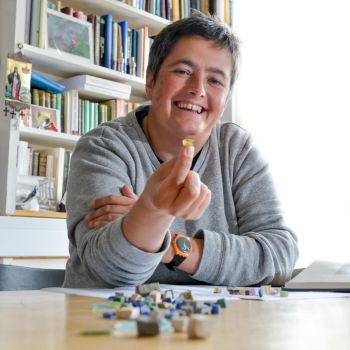In turbulent times, young people see the value in a humanities degree
By: James Hakner
Last updated: Tuesday, 11 December 2018

Professor Liz James
A familiar and tired argument is once again taking place within academia, Westminster and parts of the media. New data on graduate earnings has been published, showing, unsurprisingly, that doctors and engineers get paid more than arts and humanities graduates by the age of 29.
The news brought fresh finger pointing from politicians and commentators, talk of value for money and ‘crack downs’ on certain courses that are seen as not providing students with a strong enough return on their investment.
Putting aside the problems in using the language of the market to describe a public good, the report betrays a depressing narrowing of what an education is for. It should go without saying that love of learning, in and of itself, is a valid thing.
I don’t think many young people imagine a world where only individual gain is considered valuable and where enriching society is not.
In this increasingly turbulent world, even the most career-focused students are looking for much more value from their degree than the exact numbers on their pay cheque in a decade’s time. They value agility, being able to change direction in the blink of an eye as industries morph and evolve with rapidity. They value open-mindedness and adaptability as the gig economy and portfolio careers (and changing career paths) replace jobs for life. They value critical thinking to understand and make meaningful contributions as society transforms before their eyes.
These are all skills young people need in the modern world and workplace, and they are all skills that arts and humanities courses teach in abundance.
Take it from one of the world’s most successful companies. The skills that Google wants its employees to have are all things you learn if you do the arts and humanities - such as being a good critical thinker and problem solver and being able to make connections across complex ideas. Why would you not want to learn how to think?
Salary of course is an important consideration for many in going to university but anybody who tells you it is the main driver obviously hasn’t spent much time with young people recently.
The young people I speak to do care about financial security and opportunity but they care more about living a purposeful life, making a difference and having interesting and varied careers.
Here at the University of Sussex, our humanities alumni have gone on to become leading politicians, TV presenters, activists, conservationists, artists, authors, journalists, charity chiefs and international diplomats. Such roles will not always be lucrative, at least not straight away, but they make us all richer in so many ways. The world would be a very cold and colourless place without them.
One would hope that the vast majority of the UK cabinet and 60 per cent of the UK’s business leaders who have humanities or social sciences degrees would remember that a better grasp of history, society and culture leads to better decisions. If we are to do well at something in the future, it helps to understand why that might have gone well or badly in the past. Good history – good judgement of the past – may help devise the right strategy for the future. Bad history – a bad analysis of the past – makes for poor strategy.
To adopt the language of the market, arts and humanities degrees do offer an excellent return on investment – once you accept that the investment that many students are making is in bettering themselves and learning to change the world around them, and striving for whatever their own version of a successful life looks like.
The power of the humanities is that they allow us to reflect on what society is and should be, in a way that other disciplines cannot.
Professor Liz James, Head of the School of History, Art History and Philosophy at the University of Sussex
